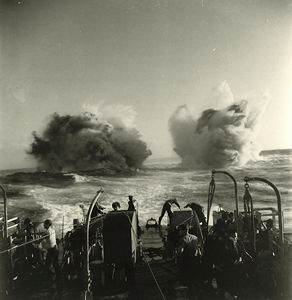In 2011, The Memory Project interviewed Jack Jeffries Strong, a veteran of the Second World War. The following recording (and transcript) is an excerpt from this interview. Born on 15 March 1928 in Lowestoft, England, Strong was evacuated to the midlands during the war. He began working at a factory in Norwich at age 14, then joined the British Merchant Navy when he was 16. In this testimony, he recalls being bombed in Norwich, as well as the threat of submarine attacks in the merchant navy. Strong eventually became a captain in the merchant navy; he immigrated to Newfoundland in 1964 to start a position at the College of Fisheries (now Marine Institute) in St. John’s, where he worked for 20 years. He died on 18 March 2016 in St. John’s. (See also Merchant Navy of Canada and U-Boat Operations in Canadian Waters.)
Please be advised that Memory Project primary sources may deal with personal testimony that reflect the speaker's recollections and interpretations of events. Individual testimony does not necessarily reflect the views of the Memory Project and Historica Canada.
Transcript
I’m Jack Strong, I was born on the 15th of March, 1928, in Lowestoft in Suffolk, England. I went to school there. It’s a large fishing town or it was in those particular days, it’s the most easterly town in England or the British Isles. When war broke out, I was eventually evacuated with the schools into the midlands and left school when I was 14, went to Norwich because Lowestoft was now a big naval port for patrol service, etc. and at 14, I went to work in Lawrence and Scotts Electric Motors, helping to make electric motors for ammunition hoists and submarine engines, etc. And I joined the sea cadets while I was there and went to their various camps and when I was 16, joined the Merchant Navy.
Well, I suppose I was a little bit confused at first when the war first broke out and within a few weeks, not a friend but a neighbour’s son was only 18 or 19 years old and was in the RAF [Royal Air Force] and lost his life within the first two or three weeks of the war.
The ship has the pilots onboard from the particular harbour and in this case, Liverpool, and he took us out as far as the bar light ship and to the pilot station of Holly Road and then carried on, you’re on your own then and the ship has the watches for the various watches on deck and down in the engine room and the catering department and then you just do your work right through until you get to New York.
On a second trip down to Australia, it was said one night that there was a U-boat [a German submarine] around in the vicinity and the naval people were trying to track it down. But I was asleep or on watch, so I didn’t know anything about that until the next day.
So in that way, I was very fortunate but from what I heard from the various members of the crew that had been to sea, since the beginning of the war, for two or three years, some of them had some very harrowing escapes with sinkings and in the water and fires on ship, etc.
And I was very fortunate well of course mainly because it was late during the war that very lucky I didn’t have any problems with air attacks or anything like that. When I was working at the war factory, when the blitz hit Norwich and we had a bomb just outside our front gate, incendiary bomb there and I had to go to work the next day and bomb wreckage from the shops were all over the streets and fireman’s hoses all over the place, had to lift my bicycle over top of them to get to work. But I mean, we just carried on and that was it.
We just sort of, you carried on and that was it. You just hoped that you wouldn’t be hit or attacked. And otherwise, you just carried on with your normal work routine. And if you were looking out, well, you were looking out for submarine periscopes or whatever other signs you were looking for. But fortunately, I was one of the lucky ones, didn’t have any serious problems in that respect.
People just think that guns and material, ammunition, fuel, materialize out of thin air on the battlefield. Then they don’t realize that they all had to be carried by merchant ships across the seas to the battle areas, wherever they are around the world and then carried from there across land, whatever, by other means.

 Share on Facebook
Share on Facebook Share on X
Share on X Share by Email
Share by Email Share on Google Classroom
Share on Google Classroom









